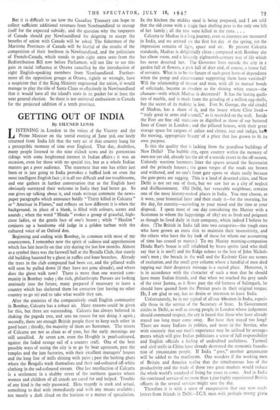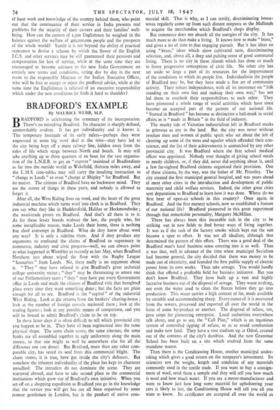GETTING OUT OF INDIA
By EILUNED LEWIS
1.4 ISTENING in. London to the voices of the Viceroy and the Prime Minister on the torrid evening of June 3rd, one lately returned from India felt that the very air of that country hung for a perceptible moment of time over England. That day, doubtless, many people listened to the nine o'clock news and its portentous tidings with some heightened interest in Indian affairs ; it was an occasion, even for those with no special ties, but as a whole Indian matters get a poor audience. The statement that one has either just been or is just going to India provokes a baffled look on even the most intelligent English face ; it is all too difficult and too troublesome, and one gathers in further conversation that as the English have obviously outstayed their welcome in India they had better go. So one gives up talking about it, and reads without comment the news- paper paragraphs which announce baldly " Thirty killed in Calcutta " or " Amritsar in Flames," and reflects on how different it is when the background, in place of a blank, is filled with colours, scents and sounds ; when the word " Hindu " evokes a group of graceful, high- caste ladies, or the gentle face of one's bearer ; while " Muslim " conjures up a handsome old judge in a golden turban with the cultured voice of an Oxford don.
Beginning and ending with Bombay, in common with most of my countrymen, I remember now the spirit of sadness and apprehension which has lain heavily on that city during the last few months. Almost as a symbol there was the farewell ball at the Byculla Club, that stately old building haunted by a ghost in ruffles and knee breeches. Already the trees in the club compound had been cut, and the pillared walls will soon be pulled down (if they have not gone already), and where does the ghost walk now? There is more than one worried com- munity in Bombay today ; the rich, philanthropic Parsecs are looking anxiously into the future, many prepared if necessary to leave a country which has sheltered them for centuries (yet having no other country to go to) and to take what wealth they can.
After the anxieties of the comparatively small English community in Bombay, Calcutta has a robust air. Many reasons could be given for this, but three are outstanding. Calcutta has always believed in shaking the pagoda tree, and sees no reason for not doing it again ; secondly, there are enough British people there to keep each other in good heart ; thirdly, the majority of them are Scotsmen. The streets of Calcutta are not as clean as of yore, but the early mornings are still unsullied. At seven a.m. even the Hooghly is pearl-coloured, against the faded orange sail of a country craft. One of the best possible ways of seeing the city is to go by boat upstream, past the temples and the jute factories, with their excellent managers' houses and the long line of mills shining with paint ; past the bathing ghats where the Bengalis wash themselves and their sad-coloured off-white clothing in the sad-coloured stream. One last recollection of Calcutta is a settlement in a shabby street of the northern quarter where women and children of all creeds are cared for and helped. Trouble of any kind is the only password. Here tragedy is stark and actual, something to deal with immediately and with any means available ; not merely a dark cloud on the horizon or a matter of speculation.
JULY 18, 1947 73;
In the kitchen the midday meal is being prepared, and I am told that the old crone with a tragic face shelling peas is the only one left of her family ; all the rest were killed in the riots. . . .
Calcutta to Madras is a long journey, even as journeys are measured in India, and we arrived on the first hot day of the spring, yet the impression remains of light, space and air. By present Calcutta standards, Madras is delightfully clean ; compared with Bombay she has elbow room, and a leisurely eighteenth-century way of life which has never deserted her. The Governor lives outside the city in a garden full of flowers, a park full of deer and, of course, a house full of servants. What is to be the future of such great hosts of dependants when the pomp and circumstance supporting them have vanished? Will the relationship of master and man, with all its mutual bonds of solicitude, become as obsolete as the shining white stucco—the chunam—with which Madras is decorated? It has the lasting quali4 ties of marble, and is made from the grinding of a million egg-shells, but the secret of its making is lost. Fort St. George, the old citadel of Madras, has a share of it, and the house where Clive
" truly great in arms and council," as is recorded on the wall. Inside the Fort are fine old staircases as dignified as those of our battered Inns of Court in London ; and the pillared houses, with their great storage space for cargoes of calico and chintz, rice and indigo, halt the moving, appropriate beauty 'of a place that has grown to fit its own purpose.
Is this the quality that is lacking from the grandiose buildings of New Delhi? The bubble city, open country within the memory of men not yet old, already has the air of a seaside resort in the off-season. Unlovely wartime hutments litter the spaces around the Secretariat and the princely houses ; the grass verges of the roads are brown and withered, and no one's front gate opens or shuts easily because the gate-posts are sagging. This is a land of deserted cities, and New Delhi is not yet one of them, but we saw her as a city of neglect and disillusionment. Old Delhi, her venerable neighbour, remains one of the most history-soaked places in India. You may choose, as it were, your historical layer and then study it—for the morning, for the day, for eternity—according to your mood and the time at your disposal. I spent most of one day considering the Mutiny with a Scotsman to whom the happenings of 1857 are as fresh and poignant as though he lived daily in their company, which indeed I believe he does. (The British in India fall into two categories—the tough ones who have grown an extra skin to maintain their insensitivity, and the others who have the fey look of those for whom our accounting of time has ceased to matter.) To my Mutiny morning-companion Hindu Rao's house is still inhabited by brave spirits (and who shall say that it is not?) and the Ridge echoes to the feet of John Nichol- son's men ; the breach in the wall and the Kashmir Gate are scenes of exaltation, and the small grey column where a handful of men died tapping out their desperate message is a sacred place. Moreover, it is in accordance with the character of such a man that he should have many Indian friends, and that when we reached the grey sands of the river Jumna, as it flows past the old fortress of Salimgarh, he should have quoted from the Persian poets in their original tongue. He, I am glad to say, has no desire or intention to leave India.
Unfortunately, he is not typical of all our kinsmen in India, especi- ally those in the service of the Secretary of State. In Government circles in Delhi, as well as among people in London whose judgement should command respect, the cry is heard that those who have already stayed too long must come away. But have they stayed too long? There are many Indians in politics, and more in the Service, who wish sincerely that our men's experience may be utilised by arrange- ments which will give Indian politicians a sense of full responsibility and English officials a feeling of undoubted usefulness. Turmoil and civil strife in China have already destroyed the economic founda- tion of 500,000,000 people. If India " goes," another 400,000,000 will be added to the maelstrom. One wonders if the working men of Britain and America realise that the simultaneous loss of the productivity and the trade of those two great markets would reduce the whole world's standard of living for years to come. And in India the continued service of no more than 1,5oo highly experienced British officers in the several services might save the day.
Therefore it is with a sense of exasperation that .one now reads letters from friends in Delhi—I.C.S. men with perhaps twenty years 74 of hard work and knowledge of the country behind them, who point out that the continuance of their service in India presents real problems for the security of their careers and their families' well- being. How can the careers of 1,5oo Englishmen be weighed in the balance against the welfare of 400,000,000 people and the prospects of the whole world? Surely it is not beyond the ability of practical statesmen to devise a scheme by which the flower of the English I.C.S. and other services may be still guaranteed their pensions and compensation for loss of service, while at the same time they are encouraged to become advisers to the new India Government on entirely new terms and conditions, sitting day by day in the next roam to the responsible Minister or the Indian Executive Officer, who will be free to accept or reject the proffered advice, while at the same time the Englishman is relieved of an executive responsibility which under the new conditions he finds it hard to shoulder?



































 Previous page
Previous page